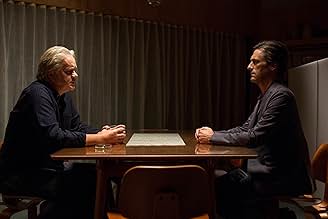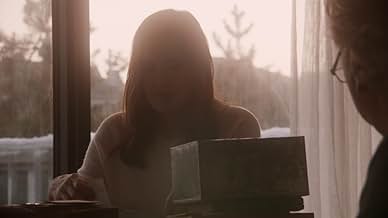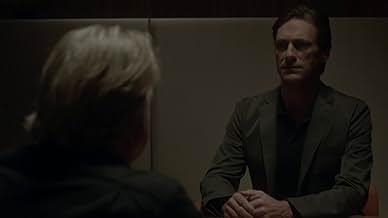Marjorie Prime
- 2017
- 1h 39min
CALIFICACIÓN DE IMDb
6.3/10
7.1 k
TU CALIFICACIÓN
Un servicio que crea recreaciones holográficas de seres queridos fallecidos permite a una mujer encontrarse cara a cara con una versión joven de su difunto esposo.Un servicio que crea recreaciones holográficas de seres queridos fallecidos permite a una mujer encontrarse cara a cara con una versión joven de su difunto esposo.Un servicio que crea recreaciones holográficas de seres queridos fallecidos permite a una mujer encontrarse cara a cara con una versión joven de su difunto esposo.
- Dirección
- Guionistas
- Elenco
- Premios
- 2 premios ganados y 9 nominaciones en total
India Reed Kotis
- Young Tess
- (as India Kotis)
Hana Colley
- 2nd Generation Marjorie, Age 10
- (as Hana May Colley)
Lois Smith
- Marjorie
- (voz)
Bill Walters
- Old Jon
- (as W.A. Walters)
Marshall Axt
- Art Museum Gallery Visitor
- (sin créditos)
- Dirección
- Guionistas
- Todo el elenco y el equipo
- Producción, taquilla y más en IMDbPro
Opiniones destacadas
This review of Marjorie Prime is spoiler free
**** (4/5)
WITH COMPUTERS ADVANCING, newer mobile devices being released at least three times a year and the chance of having a robot in our home quickly dawning. This brings the question; is the world of the sci-fi genre truly taking over the way people feel, with grief, love, humanity and memory? Well, with the latest instalments of sci-fi films such as Spike Jonze's 'Her', Alex Garland's 'Ex Machina' or perhaps as recent as this October with Denis Villeneuve's 'Blade Runner 2049' the possibility of a cerebral mind taking over the world could be sooner than once thought. Or it could even be happening right now - the fact is we just wouldn't know it.
Welcome Michael Almereyda's adaptation of Jordan Harrison's Pulitzer-nominated study of memory, grief and love Marjorie Prime. Set in a future when death doesn't have to be the end, an elderly woman named Marjorie (Lois Smith) spends her final, ailing days with a younger holographic projection of her late husband Walter (Jon Hamm), spending as much time as possible conversing about the complex structure of memory and how much it can affect us the older we get. On paper, the film's plot is simple weaving between the memories she had with her daughter (Geena Davis) who hates the holographic being of her father, her career as a violinist, to dealing with grief after the death of her husband. However, under the paper Almereyda keeps you thinking as he carefully constructs thought-provoking questions of memory, grief, family, humanity and loss. Much like 'Her', he spends his time delving deeper into the complexity of the human mind, digging it out piece by piece delivering every piece on a silver platter leaving you to think about the pieces he leaves behind.
Visual-wise, there's not much to look at aside from the holographic projection of Walter, it's not like 'Blade Runner 2049' where there's CG imagery popping out at every corner of the screen. Almereyda keeps it visually sparse keeping your eyes fixed on one special effect. And Sean Prince's stunningly serene airy cinematography is fluid and varied enough to enchant through minimalist yet stunning chamber rooms to prevent the stage bound feel. While Marjorie Prime is a slow-burning conversational piece and may not be to everyone's taste, it's an intelligent, powerfully quiet and soulful piece that will keep you asking in-depth questions about the fragile construction of the human mind playing on history, emotions and humanity it'll be almost too hard to forget.
VERDICT Hamm and Smith are stunning in an unforgettable quietly poignant sci-fi breathing in fresh thought-provoking questions about humanity and feelings.
**** (4/5)
WITH COMPUTERS ADVANCING, newer mobile devices being released at least three times a year and the chance of having a robot in our home quickly dawning. This brings the question; is the world of the sci-fi genre truly taking over the way people feel, with grief, love, humanity and memory? Well, with the latest instalments of sci-fi films such as Spike Jonze's 'Her', Alex Garland's 'Ex Machina' or perhaps as recent as this October with Denis Villeneuve's 'Blade Runner 2049' the possibility of a cerebral mind taking over the world could be sooner than once thought. Or it could even be happening right now - the fact is we just wouldn't know it.
Welcome Michael Almereyda's adaptation of Jordan Harrison's Pulitzer-nominated study of memory, grief and love Marjorie Prime. Set in a future when death doesn't have to be the end, an elderly woman named Marjorie (Lois Smith) spends her final, ailing days with a younger holographic projection of her late husband Walter (Jon Hamm), spending as much time as possible conversing about the complex structure of memory and how much it can affect us the older we get. On paper, the film's plot is simple weaving between the memories she had with her daughter (Geena Davis) who hates the holographic being of her father, her career as a violinist, to dealing with grief after the death of her husband. However, under the paper Almereyda keeps you thinking as he carefully constructs thought-provoking questions of memory, grief, family, humanity and loss. Much like 'Her', he spends his time delving deeper into the complexity of the human mind, digging it out piece by piece delivering every piece on a silver platter leaving you to think about the pieces he leaves behind.
Visual-wise, there's not much to look at aside from the holographic projection of Walter, it's not like 'Blade Runner 2049' where there's CG imagery popping out at every corner of the screen. Almereyda keeps it visually sparse keeping your eyes fixed on one special effect. And Sean Prince's stunningly serene airy cinematography is fluid and varied enough to enchant through minimalist yet stunning chamber rooms to prevent the stage bound feel. While Marjorie Prime is a slow-burning conversational piece and may not be to everyone's taste, it's an intelligent, powerfully quiet and soulful piece that will keep you asking in-depth questions about the fragile construction of the human mind playing on history, emotions and humanity it'll be almost too hard to forget.
VERDICT Hamm and Smith are stunning in an unforgettable quietly poignant sci-fi breathing in fresh thought-provoking questions about humanity and feelings.
Being based on a play shouldn't be a detrimental factor in a movie but when it's played like a play, it kinda defeats the purpose of making a film. This one really had the feel of a stage play, done by a small theatre group in a suburban small town theatre company. It did impact a very interesting idea negatively. The film making process added very little to it to help give the story impact.
There were some very interesting ideas raised in the film but they were almost lost in the flat delivery. people talking on a stage. undermines the show don't tell aspect of film.
This film tells the story of a family who uses a technology to bring back their deceased relatives using an interactive holographic technology.
The first ten minutes of "Marjorie Prime" is interesting, especially when the nature of the man is revealed. However, the remainder of the film is just boring talks. They talk for a long time at length, and nothing comes out of the conversations. Nothing happens in the film, except an increasing number of holographic images. I don't get the point of the story.
The first ten minutes of "Marjorie Prime" is interesting, especially when the nature of the man is revealed. However, the remainder of the film is just boring talks. They talk for a long time at length, and nothing comes out of the conversations. Nothing happens in the film, except an increasing number of holographic images. I don't get the point of the story.
This wonderful, slow and gentle film offers much more than mere words can say - it breathes and comes to life in the spaces between. Nothing happens and yet I couldn't take my eyes off the screen. An atmospheric, deeply felt reflection on memory, identity, ageing and loss - and a beautifully understated glimpse into what the future may hold.
Throughout the film a sense of longing and the difficulty of letting go. But perhaps also a film about healing.
Great performances all round (especially Lois Smith), seemingly simple and effortless but richly rewarding visuals and a perfect soundtrack.
Definitely not for the impatient or those seeking excitement. I came away from it breathing slower and deeper. A real gem.
Throughout the film a sense of longing and the difficulty of letting go. But perhaps also a film about healing.
Great performances all round (especially Lois Smith), seemingly simple and effortless but richly rewarding visuals and a perfect soundtrack.
Definitely not for the impatient or those seeking excitement. I came away from it breathing slower and deeper. A real gem.
"The future will be here soon enough, you might as well be friendly with it." Marjorie (Lois Smith)
Of my many blessings, memory is not the precise gift of most of my friends. I do excel at giving my impressions rather than facts, a talent itself not always impressive. The slow-moving but serious sci-fi drama, Marjorie Prime, treats a time in the near future when holograms can be created to simulate the presence of loved ones who have died.
As in Spike Jonze's Her, technology is friend and foe at the same time. Such a hologram re-creation is fraught with problems, not the least of which is supplying the creation with accurate memories. Those are as imperfect as William James predicted in his repetitive-copying description, where memories leave accuracy behind with each re-recollection.
This film, an adaptation of Jordan Harrison's Pulitzer nominee, starring Lois Smith in the titular role of an 85 year old calling forth her former husband as a middle-aged man, gently makes that point with the hologram, Walter (Jon Hamm). It asks for information or clarification, moments that break the intimacy spell to remind the living that their loving creations are just that: "I'll remember that now," says stoic, affectless Walter.
Director/writer Michael Almereyda takes the Walter hologram into a static interpretation that belies the humanity and emphasizes the robotic nature of the creation. Emotion is missing, that ineffable element of loving so more important than the physical. In that regard the film succeeds in showing the second-rate nature of remembering facts when juxtaposed with emotion. As an imperfect memorist, I feel much better.
The placid sea-side setting, shot in muted color on Long Island, with the water as emblem of the fluid nature of memory, is effective for relaying the elusive nature of that faculty: "The stream of thought flows on; but most of its segments fall into the bottomless abyss of oblivion. Of some, no memory survives the instant of their passage. Of others, it is confined to a few moments, hours or days. Others, again, leave vestiges which are indestructible, and by means of which they may be recalled as long as life endures." William James
Although Marjorie interacts with more than one hologram (certainly most lives have layers of past loved ones to be recalled if needed), the film accomplishes making us aware of the complex business of remembering, its imperfection, and its reflection of our own uncertain place in the memory of humanity.
Of my many blessings, memory is not the precise gift of most of my friends. I do excel at giving my impressions rather than facts, a talent itself not always impressive. The slow-moving but serious sci-fi drama, Marjorie Prime, treats a time in the near future when holograms can be created to simulate the presence of loved ones who have died.
As in Spike Jonze's Her, technology is friend and foe at the same time. Such a hologram re-creation is fraught with problems, not the least of which is supplying the creation with accurate memories. Those are as imperfect as William James predicted in his repetitive-copying description, where memories leave accuracy behind with each re-recollection.
This film, an adaptation of Jordan Harrison's Pulitzer nominee, starring Lois Smith in the titular role of an 85 year old calling forth her former husband as a middle-aged man, gently makes that point with the hologram, Walter (Jon Hamm). It asks for information or clarification, moments that break the intimacy spell to remind the living that their loving creations are just that: "I'll remember that now," says stoic, affectless Walter.
Director/writer Michael Almereyda takes the Walter hologram into a static interpretation that belies the humanity and emphasizes the robotic nature of the creation. Emotion is missing, that ineffable element of loving so more important than the physical. In that regard the film succeeds in showing the second-rate nature of remembering facts when juxtaposed with emotion. As an imperfect memorist, I feel much better.
The placid sea-side setting, shot in muted color on Long Island, with the water as emblem of the fluid nature of memory, is effective for relaying the elusive nature of that faculty: "The stream of thought flows on; but most of its segments fall into the bottomless abyss of oblivion. Of some, no memory survives the instant of their passage. Of others, it is confined to a few moments, hours or days. Others, again, leave vestiges which are indestructible, and by means of which they may be recalled as long as life endures." William James
Although Marjorie interacts with more than one hologram (certainly most lives have layers of past loved ones to be recalled if needed), the film accomplishes making us aware of the complex business of remembering, its imperfection, and its reflection of our own uncertain place in the memory of humanity.
¿Sabías que…?
- TriviaBased on the stage play of the same name. Lois Smith reprises her role as Marjorie, having previously appeared in two productions of the play.
Selecciones populares
Inicia sesión para calificar y agrega a la lista de videos para obtener recomendaciones personalizadas
- How long is Marjorie Prime?Con tecnología de Alexa
Detalles
- Fecha de lanzamiento
- País de origen
- Sitios oficiales
- Idioma
- También se conoce como
- Марджорі Прайм
- Locaciones de filmación
- Productoras
- Ver más créditos de la compañía en IMDbPro
Taquilla
- Total en EE. UU. y Canadá
- USD 180,608
- Fin de semana de estreno en EE. UU. y Canadá
- USD 20,668
- 20 ago 2017
- Total a nivel mundial
- USD 213,858
- Tiempo de ejecución1 hora 39 minutos
- Color
- Mezcla de sonido
- Relación de aspecto
- 1.85 : 1
Contribuir a esta página
Sugiere una edición o agrega el contenido que falta































